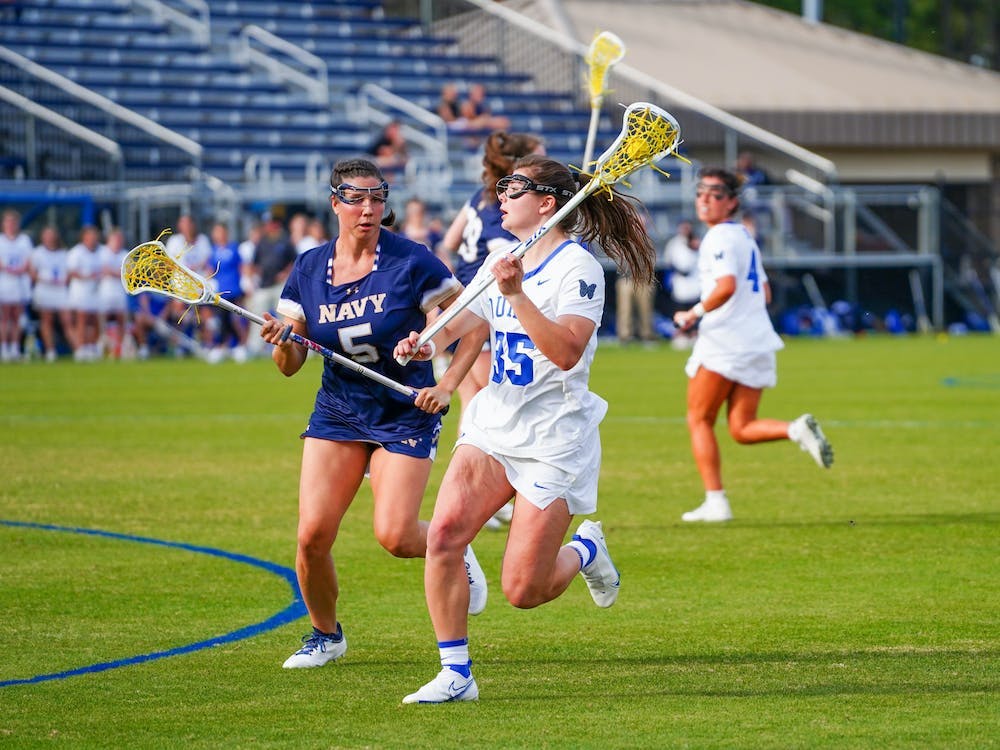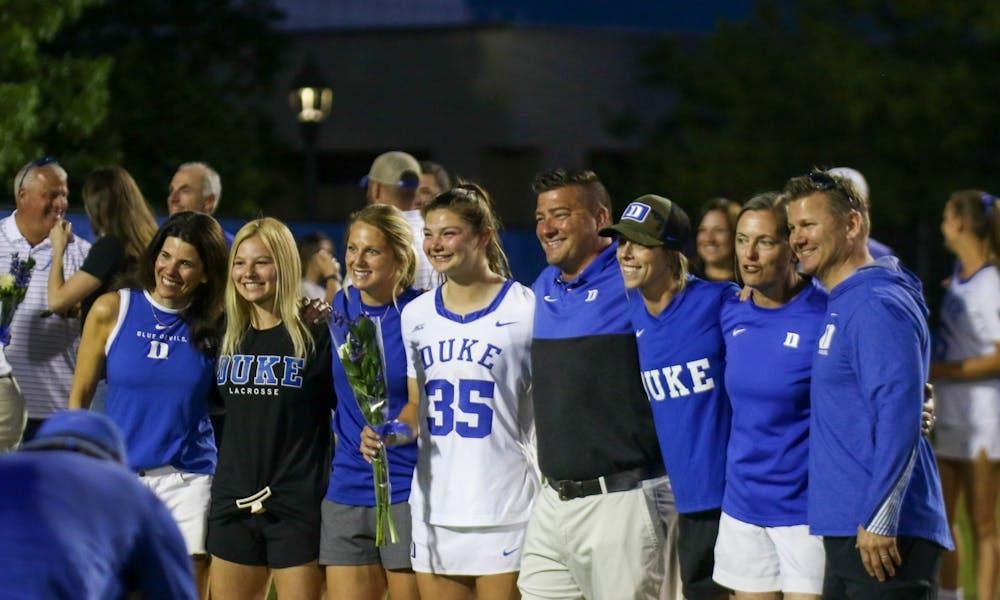For the vast majority of high school athletes, playing their sport at the Division-I level is a pipe dream. Just 2.97% of female high school athletes will play D-I. For men, it’s 2.13%.
These statistics are from 2019. Let’s rewind. What are the odds of a high school athlete committing to play D-I men’s lacrosse in 1988? What are the odds of a high school athlete committing to run for a D-I women’s track and field team in 1988? What are the odds that these athletes, setting foot on Duke’s campus for the first time in the late eighties, would return to Durham over three decades later to drop their oldest daughter off to play lacrosse, following in her parents’ footsteps and choosing Duke to pursue her sport at the highest level?
Ask the Schmalzes.
Duke women’s lacrosse midfielder Lexi Schmalz has bled blue since before she was born. Her dad, Gregg Schmalz (class of 1992), was a midfielder for the men’s lacrosse team, and her mom, Magda Schmalz (also ‘92), ran for the cross country and track team.
Now a graduate student at the Sanford School of Public Policy in her final season of eligibility, Lexi’s days representing the school on the field are waning. It's the end of an era for the Schmalzes, though they will doubtless continue to champion the grit and tenacity that Duke instilled in them on and off the field. Over the past five years, Lexi has carved out her own piece of the Duke pie, while her parents have relished in an experience few get to share with their children.
Blue bloods
For both Magda and Gregg, the decision to continue their athletic careers at Duke after high school was a no-brainer. While the facilities for student-athletes have scaled up exponentially since their time on campus, Duke’s commitment to both athletics and academics was a unique advantage. Magda viewed her prowess on the track as a tool to get into a top school. Gregg fell in love with the campus when he visited with his older brother, who was going through the lacrosse recruiting process at the time. Duke wasn’t quite the lacrosse destination that it is today when Gregg was recruited, but he wanted to be part of building a program.
Gregg’s class ended up being the first in team history to make the NCAA tournament. Thirty-two years, 25 tournament appearances and three national championships later, the Big Dance is something that Duke men’s lacrosse fans today take for granted.

The life of a student athlete at Duke then was less insular than perhaps it is today. There was no K-Center for academics or state-of-the-art training facilities. Both Gregg and Magda were involved in Greek life and lived with non-athletes. Magda likened the time commitment of being on a D-I team then to being on a D-III team today. While the pair were friends and ran in the same circles, they didn’t date until after graduation, reconnecting at the Boston airport. The rest is history.
It was obvious to the couple that their four children would grow up playing sports as well. Gregg wasted no time getting a lacrosse stick in their hands. Magda was the opposite, steering her kids away from track and field and towards team sports every chance she got.
“I always told my kids if you can run and hit a ball, kick a ball, throw balls, that's what you do,” Magda told The Chronicle. “Don't do track … luckily, all four kids got Gregg's hand coordination.”
From rink to turf
Despite Gregg giving Lexi a FiddleSTX as soon as she could hold it and coaching her youth team, lacrosse wasn’t the apple of her eye. In Needham, Mass., where the Schmalz family lives, lacrosse isn’t the dominating sport that it is in Maryland or on Long Island. That spot is reserved for ice hockey. So Lexi focused on hockey.
She won two national championships with her club team and began recruiting to play hockey in college before her freshman year of high school. There was just one glaring issue that she couldn’t get around.
“Even when I was little, ice hockey was my primary sport and I always said that I wanted to play hockey at Duke,” Lexi said. “My parents were like, ‘It’s gonna be a little difficult because they don’t have a hockey team.’”
All roads kept pointing to the same place. Eventually, she gave in. Gregg recalls his daughter telling him the summer before she started ninth grade, “maybe I’ll play lacrosse at Duke.”
That summer was an inflection point. Lexi threw herself into the lacrosse recruiting process with Duke in mind. Having just narrowed her attention to the sport at a point when others her age were already committing to top programs, she had some work to do — especially to play for the Blue Devils.
“I explored other options, because that's how the process went, but I didn't really ever want to go anywhere else,” Lexi said. “This is always where I wanted to be.”
She got a call from her high-school coach on the way home from a tournament the fall of her sophomore year. The Duke coaching staff liked what they saw. Barely a year after she first expressed interest in playing collegiate lacrosse, Lexi was on track to play the sport she loved at the school she’d grown up loving.
Get The Chronicle straight to your inbox
Sign up for our weekly newsletter. Cancel at any time.
Like father, like daughter
Dropping the oldest child off at college is a watershed moment for any parent, but for Gregg and Magda, returning to campus to send off Lexi as she followed in their footsteps was more surreal than anything.
“We drove home after dropping her off and didn’t say a word to each other for an hour,” Gregg said. “We were both lost in thought. It was one of those moments as a parent when you’re like ‘this is amazing.’ We were super proud and super excited for her.”
“I was so thrilled for her, I just knew she was going to have an amazing four years,” Magda said. “To me, Duke is the best place in the world. It's like coming home.”
With Lexi in Durham, Magda and Gregg had a good excuse to visit their alma mater and support their daughter as she wrote her own Duke story. Gregg can’t help but be reminded of his own playing days when watching Lexi.
“She’s like a mini-me … She plays with the same style of lacrosse that I played, which was ‘I’m going to go hard to the net, try to stop me’ type of thing,” Gregg said.
Gregg graduated as the top scoring midfielder in program history, and his stat lines sometimes read more like an attacker’s than a midfielder’s.
“It’s one of the best individual performances I’ve ever seen,” then-head coach Tony Collen told The Chronicle in 1990 after Duke’s win against Roanoke College, where Gregg scored six goals.
Lexi is no stranger to big performances either, scoring five goals in Duke’s win against Pittsburgh last season.
Having a former All-ACC and All-American lacrosse player as her father and coach clearly manifests itself in Lexi’s game, namely in her use of the “bull dodge” — lowering her shoulder and running through her opponent — a move that is technically illegal in the women’s game because they don’t wear pads.
“We're very, very gritty and dodge similarly down the alley, [take] outside shots … I have always heard since I've been little that we play the same,” Lexi said.

Her bread and butter last season was taking defenders one-on-one and either beating them to cage or drawing a foul and free-position shot in the process. She had 30 goals in 2023, 14 of which came off free-position chances, and her conversion rate was fourth-best in the country. Her ability to drive to the net is a tool that she and her dad have sharpened meticulously, going through the motions of different dodges in the backyard as he tweaks things such as how she holds her stick or moves her hands — the kinds of small adjustments that only a former player would know to make.
“Sometimes Gregg will be like, ‘oh, did you see she did a split dodge and then went to her left hand,’ and I’ll be like, ‘I saw her score a goal, like I have no idea what you're talking about,’” Magda said.
Family ties
A couple of Lexi's moments in Koskinen Stadium stand out in particular to her parents. One is her free-position shot last year in Duke’s 13-12 loss to then-No. 6 North Carolina. The Blue Devils and the Tar Heels were neck-and-neck, trading goals the entire fourth quarter. It looked like whoever got the last shot was going to win.
Down two goals with just more than four minutes to play, Lexi drew her signature free-position shot and headed to the top of the eight-meter. She charged off the line towards the goalie, and as she cut left she dropped her stick almost to the ground and flipped a backhand shot up and past the goalie to put Duke within one in the closing minutes.
“They show [her face] on camera and she’s super intense,” Gregg said. “I was like ‘that’s my girl.’ I didn’t teach her that move, she figured it out on her own.”
The last play of the game, Lexi drove to the cage looking to either draw a foul or score the game-tying goal, but no foul was called and the Tar Heels escaped on top. Although the Blue Devils lost, it's a game that resonated with Gregg. He saw Lexi play with a confidence that he recognized as the same which he had when he represented Duke on the field decades earlier.
“Lexi wanted the ball in her stick at the end of the game,” Gregg said. “Not everybody wants that pressure … I felt proud.”
While track is different, Magda sees her athletic spirit reflected in her daughter, too. The resilience she developed while battling injuries is something she ingrained in Lexi, who credits her mom with showing her how to overcome adversity and put her best foot forward regardless of the circumstances.
“I was up every morning at seven doing my training run,” Magda said. “I ran 350 days a year. If I had 15 days off, it’s because my coach made me take a day off.”
The “no-days-off” mentality Magda possessed as a runner is evident in Lexi as well, though being a parent has given Magda a new perspective on the demands of being a collegiate athlete.
“She comes home,” Magda said, “and I’m like ‘can’t you take a few days off and rest your body?’”
For someone that loves lacrosse as much as Lexi, rest isn’t the first thing on her mind. She was just a freshman when the pandemic ended the 2020 season prematurely, but she knew then that she’d be returning as a fifth-year to continue playing.
“As soon as we found out we had an extra year of eligibility … [returning for a fifth year] wasn't even a question,” Lexi said. “In that short amount of time, I saw how much it meant to me to be part of this program and how special it was to be a women's lacrosse player at Duke.”
As Lexi’s final season gets underway, the significance of the Duke community is not lost on the Schmalz family. The pride of representing and competing for the university and the connections forged alongside both teammates and classmates stand out as the most impactful takeaways of the family’s respective experiences. Although Lexi, Gregg, and Magda encountered the university through the lens of different eras and sports, common threads of the Duke experience are apparent as they reflect on what having the school intertwined with their family legacy means.
“Duke is the greatest place in the world and to be able to watch my daughter do what she loves now for her fifth year at the greatest place in the world will always be one of the blessings of my life,” Magda said.
“We’ll always bleed blue,” Gregg said. “Looking back at the time we were there, [and] Lexi graduating with her masters … we couldn’t be more proud.”
It’s been a long journey through winning seasons, losing seasons, elation and heartbreak. But Lexi’s anticipation to take the field for one last rodeo remains.
Gregg and Magda won’t miss a single game.

